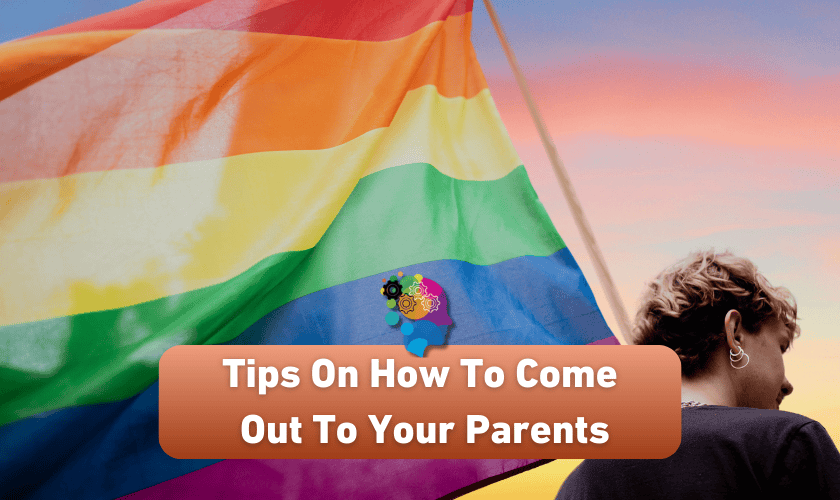In today's fast-paced world, finding moments of mindfulness can be a challenge. Embracing "The Power of Now"...

'How To Come Out To Your Parents' - as an LGBT teen can be both exhilarating and daunting. The prospect of sharing a significant part of your identity with loved ones can feel liberating, yet there's often worry about the impact on your familial relationships and their reaction.
Coming out is a deeply personal and emotional journey, necessitating thoughtful preparation and planning. Here are some tips and strategies to help you navigate this important conversation with your parents.

The process of preparing to come out to your parents as an LGBTQ adolescent can be a crucial one. As you get ready for this vital talk, keep the following suggestions in mind:
Consider writing a letter to your parents if you are not ready to have a direct conversation with them or prefer to communicate in writing.
Consider your sentiments and identities before approaching your parents. It's crucial to give yourself some time to reflect on these issues. You may feel better prepared and in control of the conversation. Think about putting your ideas in writing or sharing them with a dependable ally or friend.
Every family is unique, so when getting ready to come out, it's crucial to consider how you and your parents interact. Consider their past interactions with challenging topics and whether you have any particular worries about how they handled them.
Many need to remember coming out to extended families such as aunts, uncles, and cousins. Even if coming out to them isn't essential for your peace of mind, it can open up the possibility of gaining more support from your LGBTQ community, even without parental involvement.
Reaching out to any close relatives who may have accepted their sexuality earlier can give insight into how they handled coming out and receiving acceptance. Knowing which family members have come before you on this path makes coming out more accessible and strengthens communication between yourself and the larger family unit.
Coming out can be a complicated process; therefore, having a network of friends and allies support is critical. Think about opening up to a close friend or relative you can trust or joining a support or therapy group.
As you get ready to come out, it's a good idea to look into resources and difficulties you might encounter. This can include details on LGBTQ+ rights in your area and tools for getting support and creating a welcoming, accepting community.

It's crucial to be ready and plan before conversing with your parents about who you are. Here are some tactics to take into account:
It's crucial to pick a time and location that are both private and favorable to having a challenging conversation. Choose a moment when you and your parents are generally calm and unhurried. Think about whether you feel more comfortable having the conversation at home or in a neutral setting.
A script or set of talking points might help direct the conversation. This can aid in maintaining concentration and ensuring you cover all the crucial topics you want to make.
The Top Communication Books or Affective Communication: Exploring The Link Between Language and Emotion, should help you express yourself.
Your parents might have questions, and it's essential to answer them honestly. Let them know if you don't know the answers or need more time to think about it.
If you don't feel comfortable answering some of their questions, you can always explain why and set boundaries as to what questions you're willing to answer.
The acceptance process varies from family to family, while some may be incredibly open and supportive no matter what. Others may take a longer time to get used to the idea.
Self-care and stress management are vital to practice because talking about your sexual orientation, or gender identity can be unpleasant. Make time for enjoyable activities that help you relax, such as deep breathing exercises or meditation. It would help if you also considered practicing relaxation techniques like these.
Coming out to your parents can be nerve-wracking experience, and you may find that you need to prepare for a range of reactions mentally. People respond differently to news like this, and coming out is no exception.
Some parents understand the situation is not always set in stone, and the level of acceptance can vary depending on family dynamics. Though it is not easy, it may be necessary to remain even-keeled if you encounter any initial resistance.
It's crucial to be ready for challenging or unfavorable reactions if you're coming out to your parents. You can take steps to deal with these feelings healthily and helpfully, even if it might be challenging to hear unpleasant comments or see your parents unhappy. Here are some ideas to think about:
If your parents react negatively, it's vital to remember that they are probably experiencing a range of emotions and might not fully get what you're going through. React with love and empathy. Try to be friendly and understanding in your responses and put yourself in their shoes.
You must set boundaries if your parents' responses are very upsetting or unsupportive. Informing your parents that you need some time or space to consider their response or that you want to continue the conversation once they are prepared to be more understanding is one way to do this.
Having a network of reliable friends and allies to lean on can be beneficial while handling challenging responses from your parents. These people can help you deal with your emotions and provide emotional support. And if you need help making friend, we suggest reading How To Make Friends When You Have Social Anxiety.
Having a network of reliable friends and allies to lean on can be beneficial while handling challenging responses from your parents. These people can help you deal with your emotions and provide emotional support.

Finding and creating a supportive group can be crucial to your development as a gay adolescent. Here are some pointers for locating and creating a supportive community:
Support groups, social clubs, and youth organizations are just a few of the LGBTQ+ groups and resources that are available in many communities. These could be a fantastic method to get in touch with others who can relate to and share your experiences.
Here are some steps to help you find such communities using Google:
Many online forums and communities are dedicated to LGBTQ+ people and allies. These can be fantastic platforms for social interaction, question-asking, and the search for support and direction.
Being part of a support or therapy group, particularly for LGBTQ+ people, can be a terrific way to discover community and support. These groups can provide a secure and encouraging setting where you can talk about your experiences and difficulties and connect with people who can relate.
Finding mentors who can offer guidance and support is a unique tool for coming out to your parents. It is often tough to take this first step, so having a support system of trusted adults is a great way to stay motivated and positive throughout the coming-out process.
Having someone with whom you can open up about how your coming-out journey has been going can provide reassurance in times of difficulty and confusion and offer helpful advice and a counsellor if needed. If coming out to your parents feels too much to take on alone, finding a mentor with similar experiences can ensure that you're not facing your challenges alone.
If you have homophobic parents, having a conversation about their religious views can be daunting. However, it's essential to lead with love and open the dialogue respectfully. But here are some things to remember before coming out;
Becoming financially independent can be a critical step towards coming out to your parents. Being financially dependent on them for money or living in their home puts you at risk of losing essential resources if the conversation becomes difficult or if it turns out that they need to be more understanding and accepting.
Preparing yourself with a stable job, housing, and other financial support can give you more bargaining power and provide alternative solutions should things not work out as planned.
If you are not ready to fully come out to your homophobic parents or if doing so would put you in trouble, it may be necessary to pretend to be someone you are not to survive and have a normal childhood.
If you are sure you want to come out, it is best to save money and plan where to stay if the situation does not go well. Consider making legal or financial plans ahead of time if your parents decide to cut off all ties with you.
Although you are coming out as something new, at the same time, you are still the same person they've always known. Remind your parents that no matter what changes your outlook, you will always view them in the same way, through the lens of unconditional love.
Give them the time and patience to adjust, and don't forget to remind them that even though it may be a new thing for them and their family, this is who you have been all along.
Talking to family members - including our parents - about religious beliefs can be challenging. However, it's important to remember that different translations of holy books may have various interpretations.
If a family member believes their religion is right and everyone else's is wrong, it's crucial to remind them that faith is based on personal choice, not judgment or hate.
Setting boundaries and being clear about your needs will help you take care of yourself if your parents do not accept you. It's essential to prioritize your well-being and happiness, even if your parents are not getting it.
Coming out to your parents can be tricky, especially if it's not what they expect. Rather than allowing yourself to be at the mercy of their reaction, it might be helpful to flip things around and consider that you are rejecting them if they do not accept you're coming out.
Reframing the issue in this way allows you to maintain control and confidently stand by your thoughts and feelings without feeling pressured or judged.
Finally, it's important to celebrate yourself and your identity. Surround yourself with people who accept you for who you are and create a space where you can express your true self.
Accepting yourself is critical to finding happiness, even if your parents disapprove of your lifestyle. To help celebrate, we recommend The Best LGBTQ Accessories.
Regardless of how your parents respond, it's important to remember that you are valuable and lovable irrespective of the outcome. You have the right to be accepted for who you are, but ultimately, it is up to you to take care of yourself if your parents do not receive you.
How Do You Prepare To Come Out As Queer?
There's no one right way to do this, as every person and situation is different. However, be sure to talk someone you trust about what you're planning to do, and prepare for possible negative reactions from those around you. Also, make sure you're ready emotionally and mentally before coming out.
What Is The Best Way For An Atheists To Come Out?
There is no one "right" way for atheists to come out, since there's no one right way to be atheist. Some people might choose to come out as atheists gradually, over time, to family and friends who they know will be supportive.
Others might choose to come out in a more public way, through social media or other online platforms. Still others might choose to come out as atheists in a more personal way, through conversations with close friends and family.
How Do You Tell If Your Parents Are Homophobic?
One way to tell if your parents are homophobic is if they make negative comments about LGBTQ people or refuse to accept them. Another way to tell is if they don't want you to associate with LGBTQ people or participate in LGBTQ-related activities.
In today's fast-paced world, finding moments of mindfulness can be a challenge. Embracing "The Power of Now"...
In our fast-paced world, finding moments of tranquility can be a challenge. Meditation apps offer a convenient...
In our fast-paced world, taking time for self-reflection and mindfulness is essential for well-being. Journaling can be...
In today’s fast-paced world, managing stress has become an essential aspect of maintaining overall well-being. Two popular...
Dissociation can be a challenging experience, especially the one that happens at work. Are you experiencing dissociation?...
Bionic reading transforms the reading experience for ADHD individuals by guiding the eyes for focus and understanding. Dive into the world of bionic reading.
Explore the complexities of postpartum depression and genetics in our blog 'Is Postpartum Depression Hereditary?' for insights into maternal mental health.
